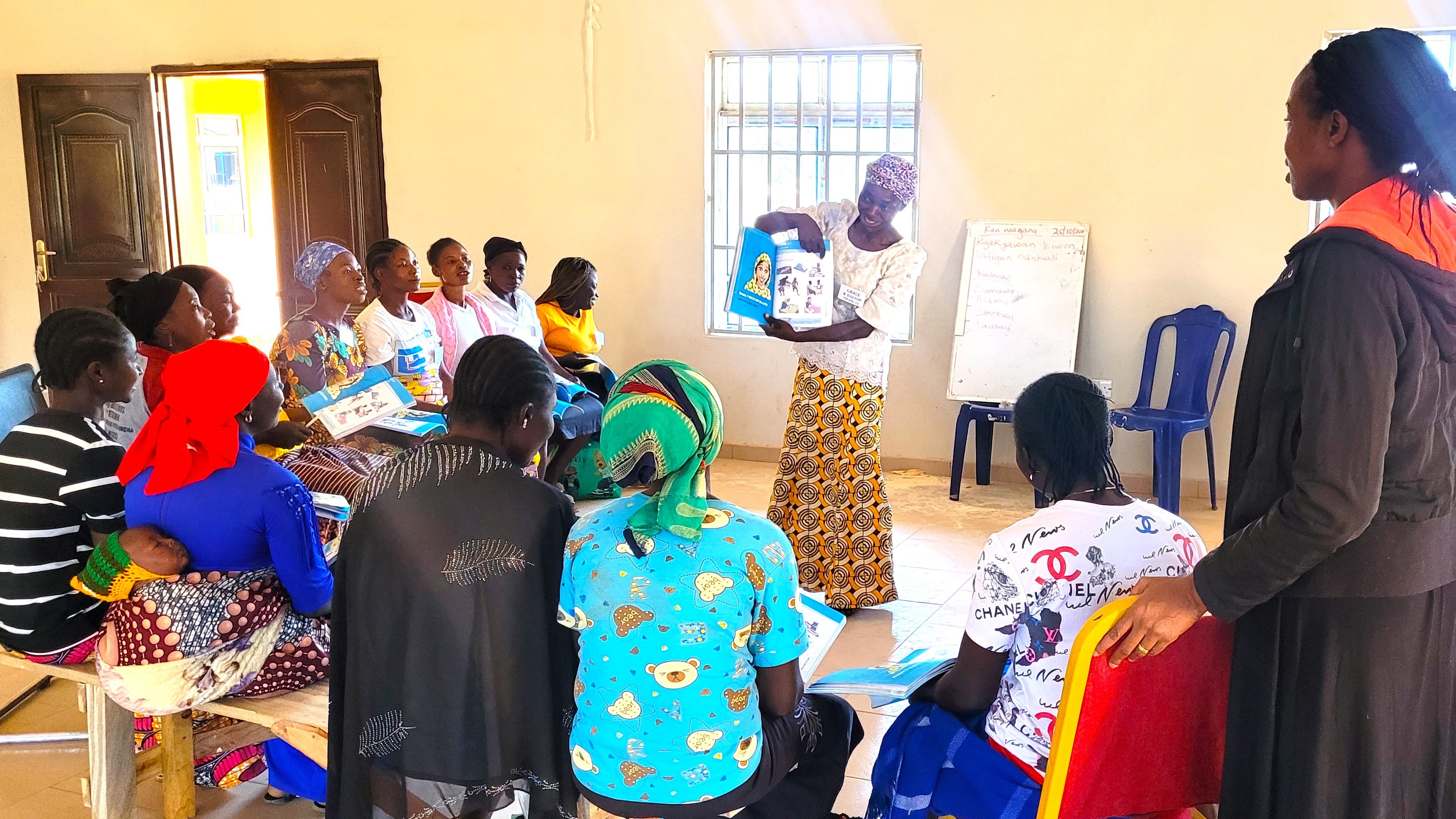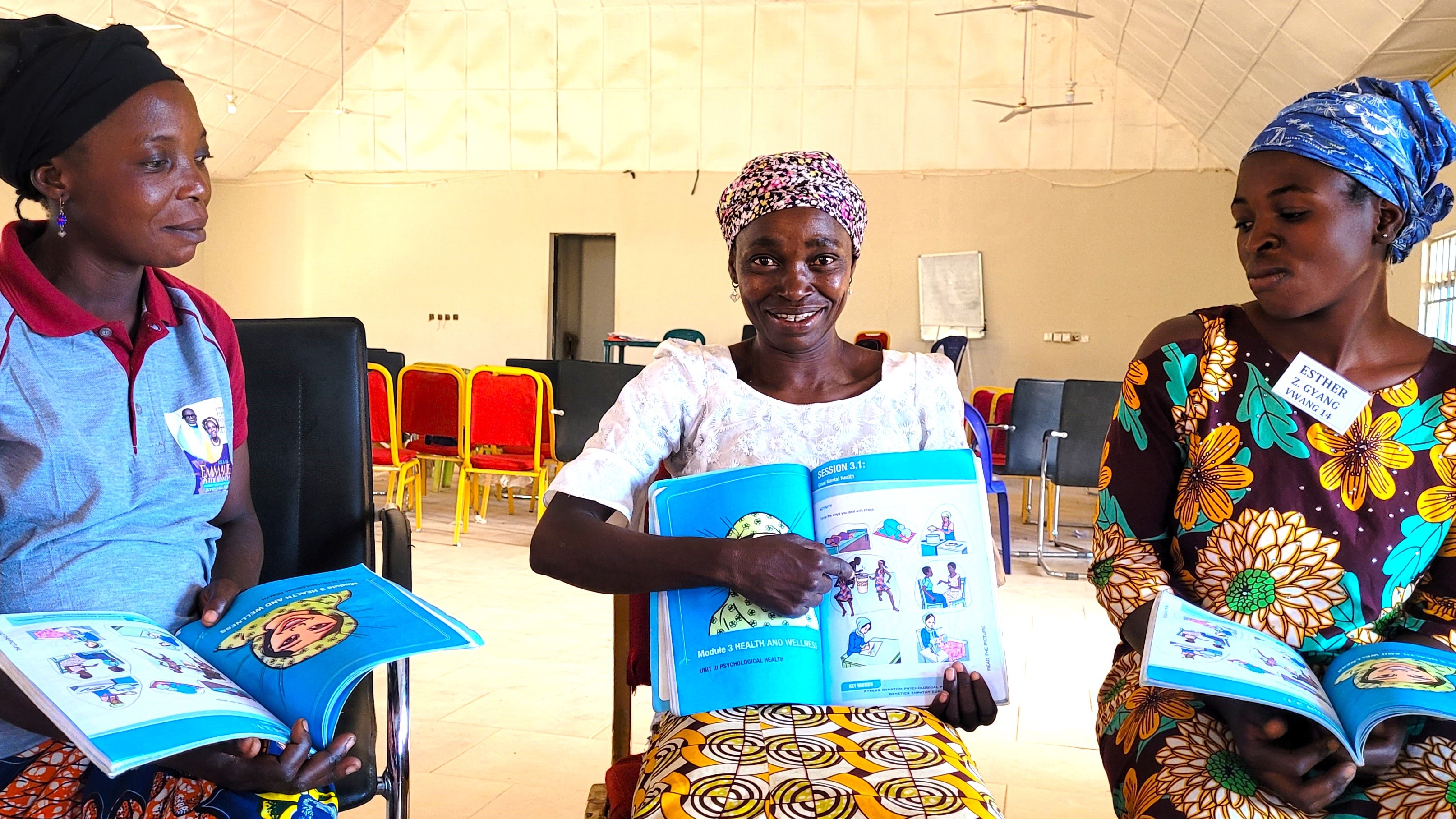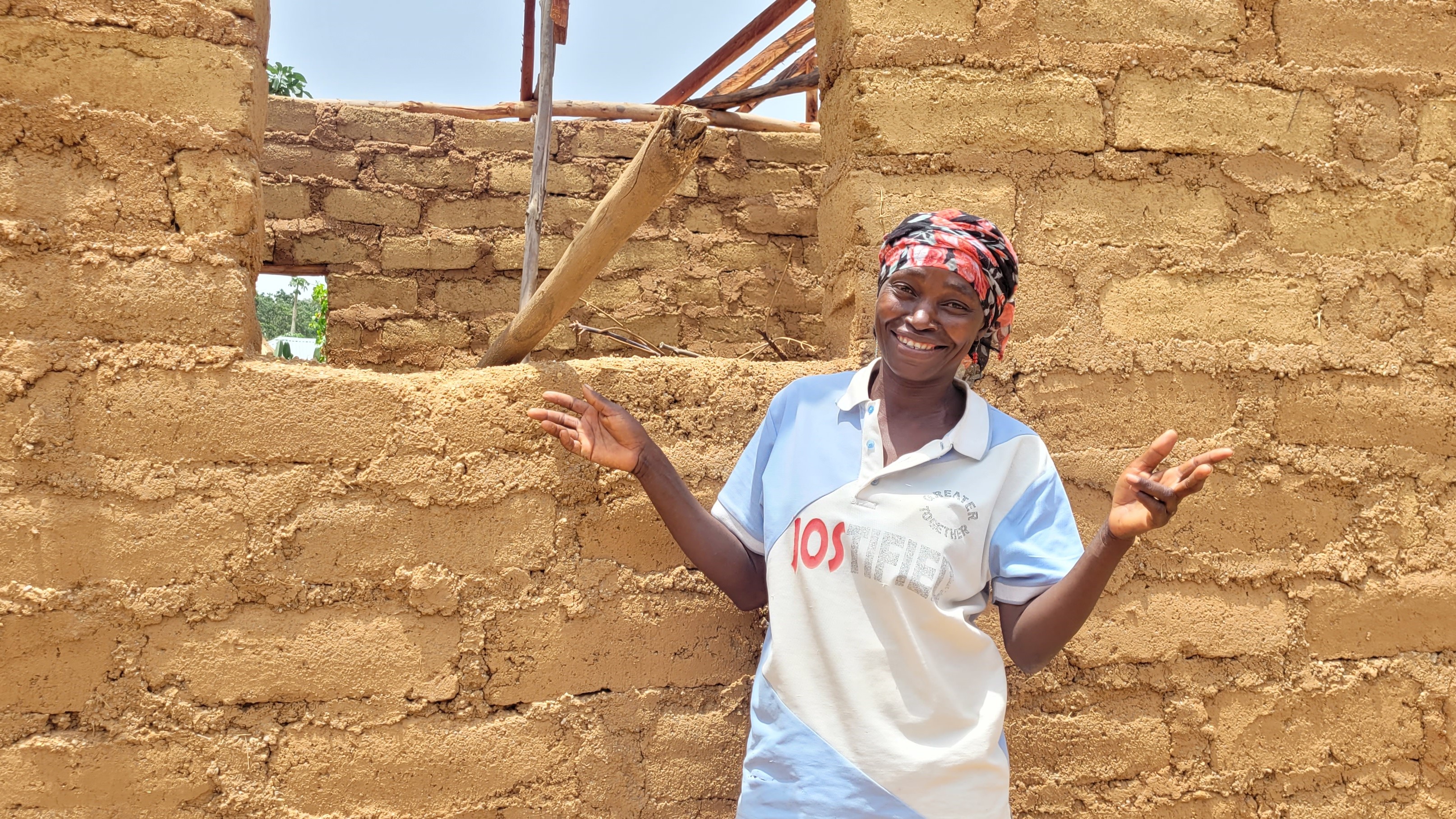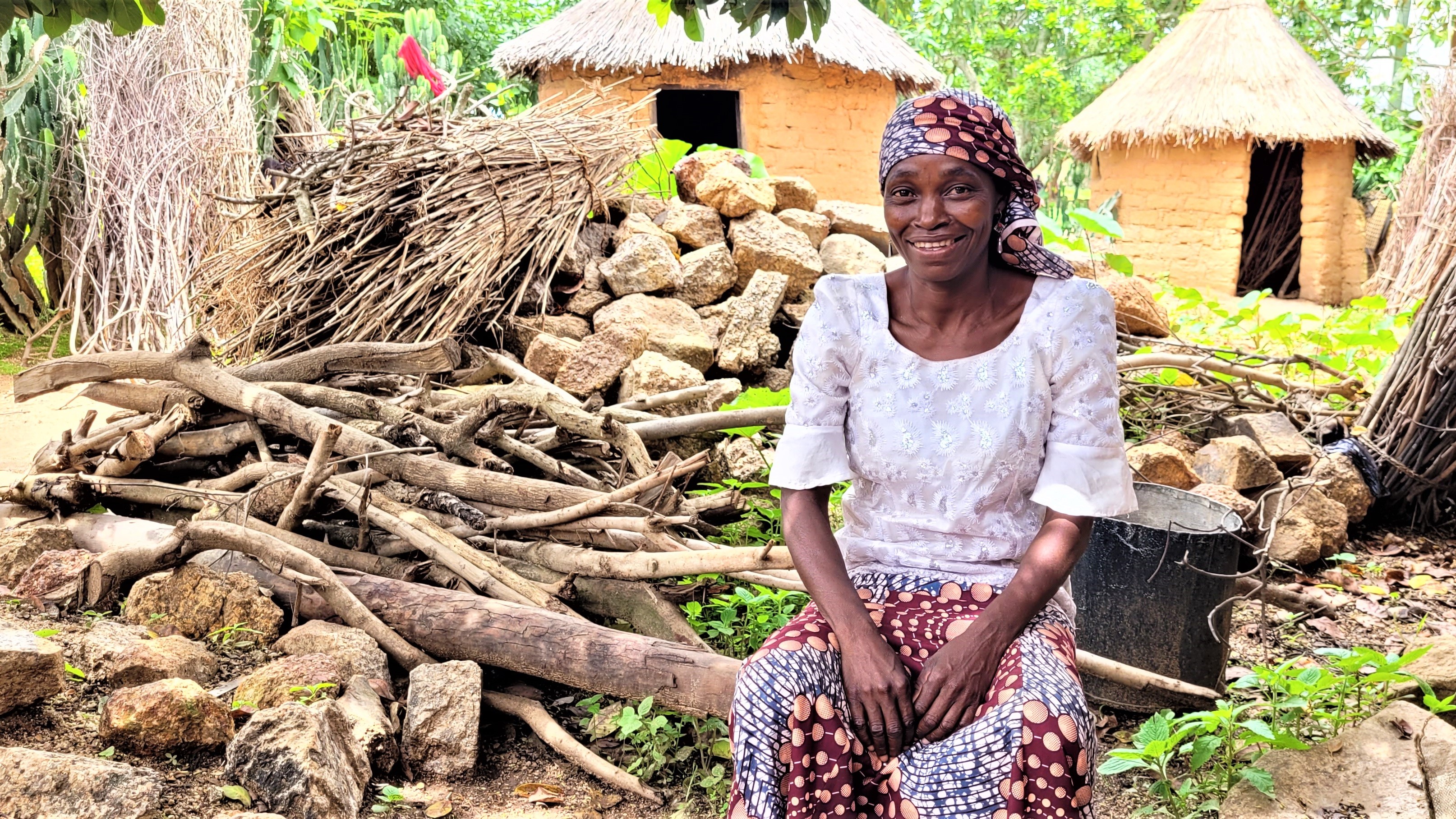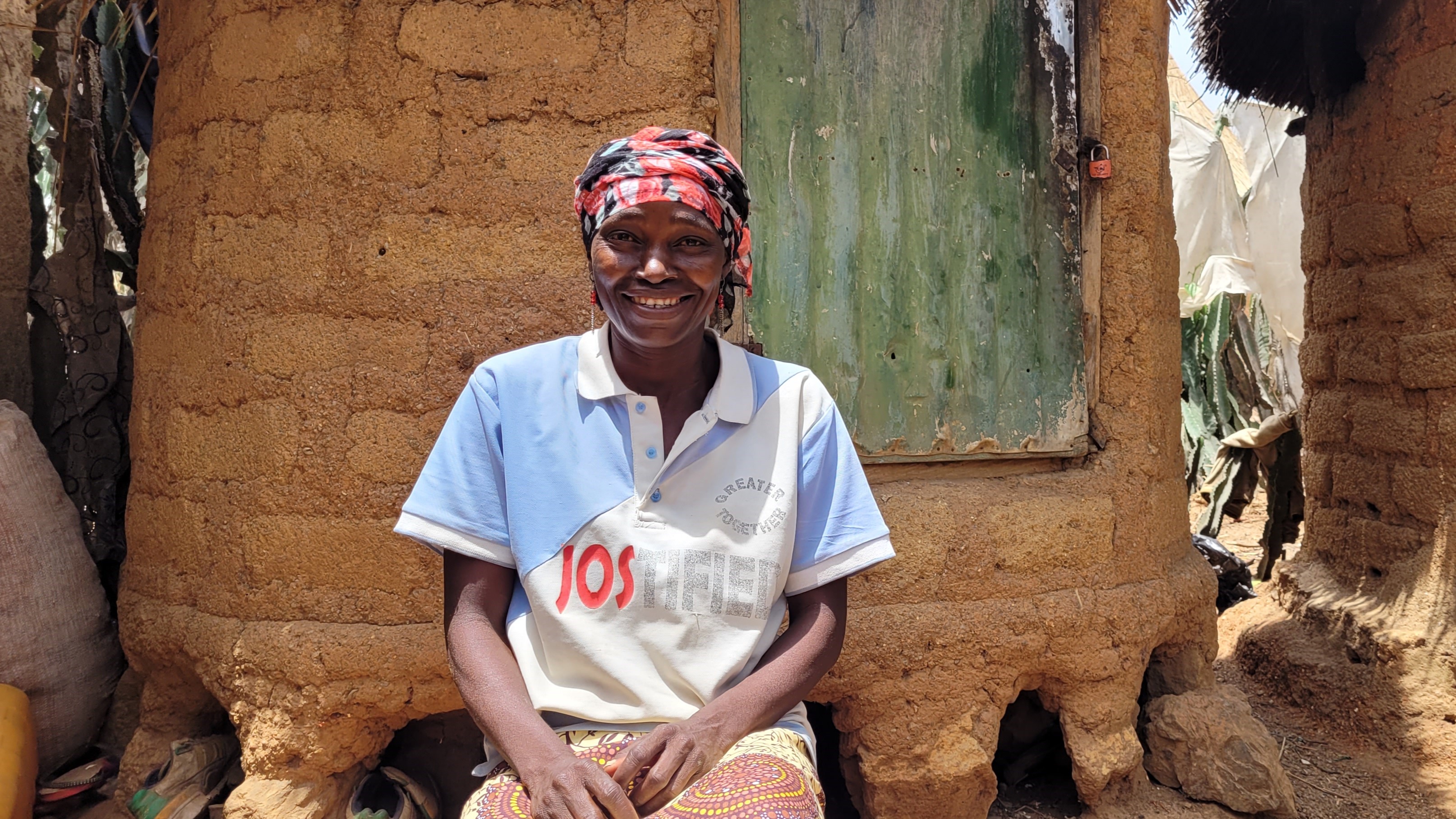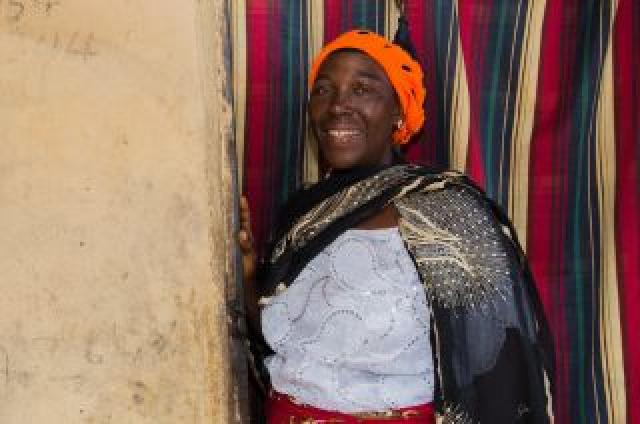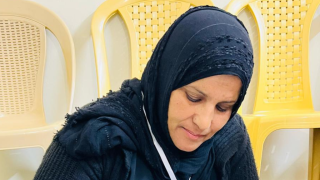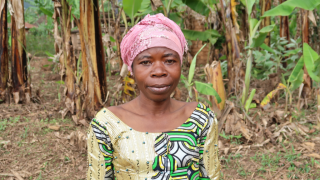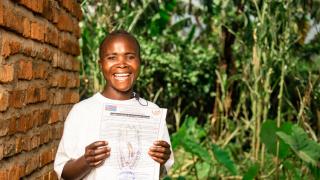Grace's story
My name is Grace
I enrolled in the Stronger Women, Stronger Nations programme in May 2023. This is my story
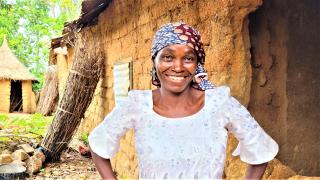
I am 46 years old. I am married with six children. My husband and I are farmers which is the predominant occupation in this community, and we farm fonio (a West African grain), maize, guinea corn and finger millet. I have a side business selling tofu and gruel (our local drink) as an additional source of income.
I grew up in Wereng with my parents, stepmother and four siblings. I attended primary school up to Primary 6, but had to drop out due to lack of funds. My parents were farmers who grew maize and fonio as their major source of income, and this was barely enough to meet the family’s needs. I had no choice but to join my family on the farm since school was no longer an option, and this made me sad because I had dreams of becoming a teacher.
A year later, when I turned 12, a distant relative who worked in Kaduna State came to greet my parents and told them that her colleague was looking for a nanny to take care of her children. She wanted me to go and work for them since I was no longer in school, so that I could support the family with the monthly salary I would be paid. She took me to her colleague’s house, and I must confess that I was scared being far away from home and living with strangers. Living with this family was a bittersweet experience for me because I was treated well, I had food to eat unlike back in the village, but I still felt very lonely and longed for home.
After 3 years, my aunt visited to tell me that I had lost my grandmother who had been sick, and we would be going to the village for her funeral. We left two days later and attended my grandmother’s burial. After the burial, I told my aunt and parents I would not continue the work and hoped they had made judicious use of the salary that they were receiving on my behalf.
I stayed home working on the farm until I met my husband in 1993. The first time I met him was in the market when I went to buy foodstuff. There was something about him that drew me to him and when he walked up to talk to me, I was excited that he had noticed me too. From then on, we were inseparable – and in a matter of months, I moved in with him at his family house where we stayed until today.
Life after marriage was good but came with its challenges, especially when l could not conceive after two years of trying. I got so desperate that I started visiting native doctors and taking herbal mixtures to help me conceive. When that did not work, I went to the hospital and tried conventional medicine, but even that did not work for me.
While I was trusting in God for a baby, my husband became impatient and married another wife. His family refused to accept her, saying it is me that they know and bringing in another woman, pregnant or not, will not change anything. My husband was upset because the woman he brought was rejected and he decided to take out his frustrations on me by beating me all the time for no reason. It got to a point that I could not bear it anymore, so I went back to my parents’ house. Unknown to me, I was two months pregnant. When I found out, I was so happy.
My husband found out about the pregnancy when I was nine months gone, with only a few days left. That was when he came with his parents to plead with my family to let them take me back home with them. After hours of meeting, they were asked to pay my bride price before I would be released to them. He paid the money, apologised for all he had done to me, especially the beatings, and promised never to repeat it again. I went back the next day and few days after, I gave birth to Victor.
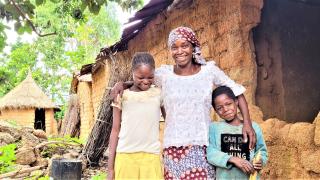
In 2018, I travelled to my village in Wereng with my last son Moses, who was four years old at the time, to see my parents and siblings. I spent time with my brother, his wife and three children at their house – not knowing that would be the last time I would see them.
On the same day, at about 11pm, we heard gunshots and screams from the neighbouring houses.
My parents ran into my room and told me to quickly carry my son and run as fast as I could because the village was under attack by gunmen. We ran out of the house and saw people running all over the place. Dead bodies were left on the streets as houses went up in flames.
That was the longest night of my life. I walked for hours and hours until we got to the bush where we hid overnight. I had never been so scared in my life and just kept praying and trying to calm my son so he would not make a sound. In the early hours of the morning, we walked to the neighbouring village and stayed with other survivors in the community church for four days. During that period, my parents called me to tell me that my brother, his wife and two children had been killed at home during the attack and the only survivor was their last son who was seven months old. He was hit in the head with an axe and left for dead – but was miraculously found alive by military personnel who had gone to rescue survivors left in the community.
One day during an announcement in church, I heard about the Women for Women International programme.
I decided to join because of the positive changes I had seen in the lives of past participants.
I do not regret joining the programme. I feel like the luckiest woman after learning so much in such a short time.
July 2023
Three months into the year-long programme
I have learnt that women must come together, set aside their differences and work towards a common goal. If they do this, there is nothing they cannot achieve.
My group sisters and I have created a strong bond by visiting and encouraging each other, especially when one of us is in need. One of our group sisters lost her husband, and we went to visit and stay with her. We contributed some money to make gruel and shared it with visitors who came to console the family. She was so happy that we took some burden off her and appreciated our support, saying she felt so special and loved by us. This also made us very happy and gave us a sense of fulfilment, encouraging us to further strengthen the bond between us.
I chose piggery as my vocational skill because I want to learn new skills that will help me set up a lucrative business in my community.
I am also a member of a savings group with my 24 Women for Women International group sisters. We have just started saving and I cannot wait to see how far this takes me.
October 2023
Mid-way through the programme
In life, one will always face conflict between friends and family. I have had my fair share of disagreements that led to unfriending some of my friends and even making me stay away from family. I felt I was always right because I tried not to offend anyone intentionally. What I did not realise is that others are entitled to their feelings as well and deserved the benefit of doubt.
In this programme, I have learnt negotiation skills, mediation and about peacebuilding.
Recently, as a prayer leader in my church, a member confronted me on an issue I knew nothing about and started talking rudely to the point of hitting me. The old me would have hit her back and a huge fight would have ensued, but I looked at her, took a deep breath and responded politely, explaining that I knew nothing about her accusations and pleaded with her to calm down and listen. After having a discussion, she realised that she was wrong and apologised. We have been great friends since that incident, and I am very proud of how I handled that situation and prevented it from escalating. Being in the programme has really helped me by teaching me how to be in charge of my emotions and make better decisions that have improved a lot my relationships today.
After the session on good mental health, I realised I was carrying a lot of hate and anger since the loss of my brother and his entire family.
For a while now, I have been managing hypertension (high blood pressure) because of the pain and worry I had let myself wallow in. The session was intensive, and I lost a few tears while sharing my story with my group sisters. Sharing made me realise that so many other people had suffered the same fate as me but have learnt to manage it better and still live healthy lives.
I learnt that stress and grief have a negative impact on one’s health and if not managed properly, it can lead to mental illness. I used to have sleepless nights worrying about my loss, my life, my children and their future. But now I have found ways to cope whenever I am stressed by meditating, listening to music, visiting my close friends, taking a walk in my village, dancing and joking with friends and my children, or even taking a nap when I feel overwhelmed by any situation. This has worked for me, and I now realise that your body gives you back what you feed it, so I choose to feed it positivity always.
Being in a better mental state has given me energy to concentrate on my life and business.
With part of my stipends, I have expanded my fried tofu and gruel business. Other people buy from me to retail around the community on market days, increasing my profit from N1500 to N4500 (£0.71 to £2.12 GBP), and even N5000 (£2.36 GBP) on a good business day.
I never believed I could get to a point in my life where I will be able to handle money back and forth like this! I can proudly beat my chest and say that whatever comes my way in terms of money, I can double it within a short time.
I chose piggery as my vocational skill because I want to learn new skills that will help me set up a lucrative business in my community.
I am also a member of the savings with 24 of my group sisters where I save between N200 to N1,000 (£0.9-£0.47 GBP) every week. After some months of saving, I was able to access a loan of N10,000 (£4.72 GBP), which I used to buy a piglet to rear at home using the knowledge I gained in training.
I plan to use my savings to buy about three more piglets for rearing, so it becomes a major source of income for me.
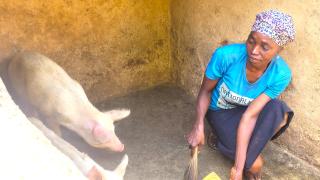
April 2024
Final month of the programme
After the session on women’s rights, I learnt more about my rights and decided to act.
I went back to my father’s house and spoke with the family elders concerning the farmland that my father owned before he died. It had been leased to someone who farms on it every year, but I wanted to reclaim it for my personal use.
They listened to me and appreciated that I came to them and spoke so confidently.
They permitted me to see the man and after discussing it with him, I refunded his money and then got the land back. I now farm maize and sweet potatoes on that piece of land.
In my husband’s house, they shared the economic trees on their farmland amongst their sons, but for whatever reason, they excluded my husband. At that time this happened, I did not bother to say anything about it, but after learning that I have the right to speak up, I encouraged my husband to confront his people about this injustice. It took a while, but we finally got our share. Even though it was a dead, unfruitful tree, it was still valuable to us because we cut it down and used it for the beam of our new building.
I am very proud of myself for achieving all of this.
My confidence is at an all-time high right now, and I feel like I can take on the world if the need arises.
I have also been able to use my knowledge on women influencing decisions in the home and community, to join my group sisters on advocacy walks, and visits to the district head to decry the indiscriminate use of illicit drugs by men and youth in our community. We spoke boldly about the consequences of this menace, and how it has significantly hampered the growth and development of the entire community. We also took this advocacy to churches, and other gatherings, calling on leaders to take decisive action against the suppliers of these illicit drugs, and called on the victims to tow a new path.
There is a widow – my neighbour – who I was particularly concerned about. She resorted to excessive drinking, and ingesting drugs after she lost her husband. I tried to get close to her, advised her on the harmful effects of what she was doing on her physical and mental health. Thanks to the Stronger Women, Stronger Nations programme, I know a bit about good mental health and how to achieve it. I told her to get out of that dark mental state she was in, socialise more with people in the community, join the community women’s group, and to always sing and dance when she was feeling sad. I am happy that she took my advice.
She is a better, more radiant version of herself now.
The pig I bought earlier has grown and I sold it. I bought another one, with some chickens, as well. My plan after graduation is buy a goat and two piglets to add to the pig and chickens to rear, and I will continue saving in my Village Savings and Loan Association to enable me to complete the building that we have started.
I want to thank Women for Women International for bringing this programme to Vwang community and transforming our lives for good. You are doing a very good job! I am proud to be a part of this programme and I will never forget what you have done for me.
Read more
Saleha
subtitle:
"This is the first time I have the confidence to share my story."
After surviving conflict and tremendous loss, Saleha is finding ways to rebuild her life and care for her eight children. Read Saleha's story, shared in her own words.
Marie Jeanne
subtitle:
The involvement of women in decision-making processes is essential for a balanced and equitable society. However, men are in control of the processes in Marie Jeanne’s community. Read about how she has fought for women’s voices to be heard in community gatherings, and dared to challenge other injustices too. #SheDares to speak up on behalf of all the women in her community.
Angelique
subtitle:
Many women in the Democratic Republic of the Congo don't own their own land - even though most farmworkers are women and despite laws in place to protect their right to it. Read about how Angelique's journey through out programme led her to become a Change Agent and persuading a skeptical community that she had just as much right to own land as her husband.

